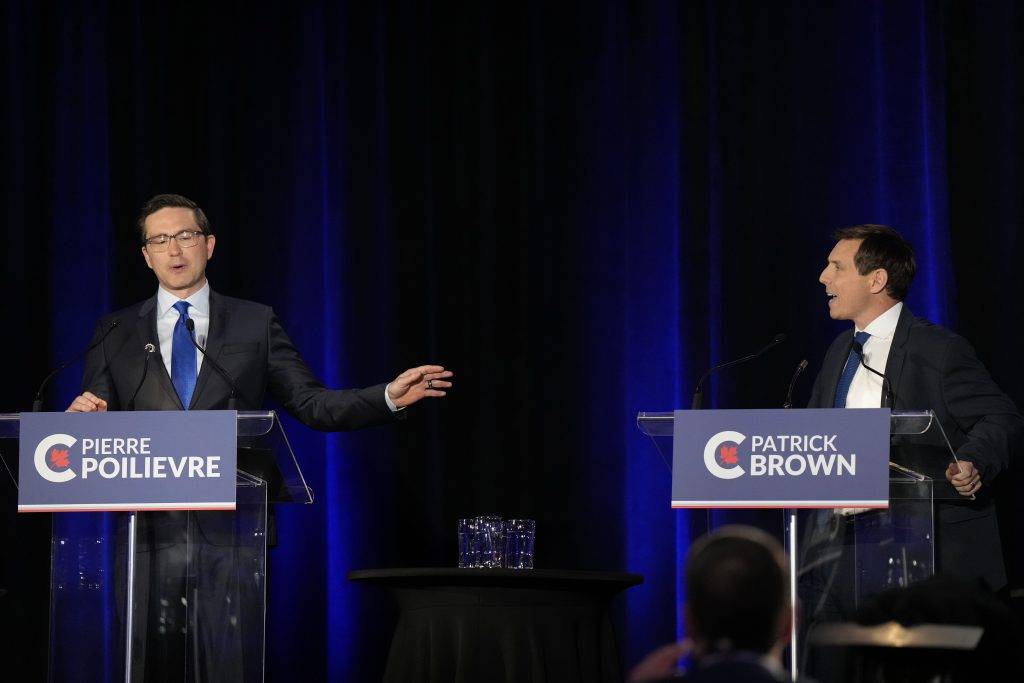Canada News
Tory leadership contenders cross swords on inflation, Quebec’s secularism law

LAVAL, Que. — Candidates competing to lead the federal Conservatives squared off over contentious language laws, immigration, inflation and the trucker convoy in the race’s only French−language debate Wednesday night.
“I am against Bill 21,” longtime Ottawa−area MP Pierre Poilievre said on stage before several hundred Conservatives gathered in Laval, Que., where Quebec’s controversial secularism law was a hot topic.
Former Quebec premier Jean Charest and Patrick Brown, the mayor of Brampton, Ont., both accused Poilievre of evading clarity when speaking about the law in French in Quebec, where it has widespread support.
The legislation prohibits certain public servants in positions of authority from wearing religious symbols on the job.
Poilievre said he would not overturn the stance of federal Justice Minister David Lametti, who said earlier Wednesday that Ottawa would join a challenge to the law should it reach the Supreme Court.
Charest said that the prime minister “shouldn’t be neutral” on the legislation, while stressing Quebec’s right to make laws within its jurisdiction.
Brown has spent the race campaigning against the religious symbols law, which he calls an affront to religious freedom.
Candidates took the stage one day after a language reform bill passed Quebec’s legislature. Critics say it goes too far in protecting the French language by potentially denying the province’s anglophones the ability to access services like health care in English.
Leadership candidate Scott Aitchison, an MP from rural Ontario, released a statement ahead of Wednesday’s event pledging that a government led by him would work with Quebecers to see the new language bill and province’s religious symbols law repealed.
He called Premier François Legault’s language reform “divisive” and said the bill is “designed to exploit frustrations by discriminating against the English−speaking minority in Quebec.”
“Government policies that unite francophones and anglophones are what Canada needs. We cannot allow fear and anger to win in this country,” Aitchison said.
Asked during the debate how to curb illegal arrivals into Quebec at the unofficial border crossing at Roxham Road, Poilievre said he is “against illegal entries, but at the same time I am for immigration,” noting his wife came to Canada as a Venezuelan refugee.
Should he become prime minister, Poilievre pledged to reach agreements with provinces within 60 days to recognize professional qualifications for newcomers to Canada.
Charest stressed the need to renegotiate the Safe Third Country Agreement, which allows Canada to turn back potential refugees who show up at land ports of entry along the Canada−U.S. border.
The agreement says they must pursue their claims in the U.S., the country where they first arrived, but it only applies at official border crossings. Those entering at irregular crossings such as Roxham Road, near Hemmingford, Que., must be processed in Canada.
Charest also lamented “long” delays at the Immigration Department.
“You have to clean up the department to give a decisive boost,” he said.
Brown attacked Poilievre for not publicly condemning the “white replacement” conspiracy theory espoused by Pat King, a leader of the Ottawa convoy protest.
Poilievre responded by saying he has in fact “rejected” King’s remarks, accusing Brown of dividing Conservatives by making different pledges to various community groups behind closed doors.
On inflation, Charest jabbed Poilievre for having stated during the English−language debate earlier this month he would fire the Bank of Canada governor if he were elected prime minister.
Ontario MP Leslyn Lewis also joined Brown in attacking Poilievre for his embrace of the cryptocurrency Bitcoin as a solution to inflation.
Lewis, who was often reading from her notes during a debate where she said she is learning to speak French, said Poilievre’s position was wrong.
At one point, Brown said Poilievre’s position on Bitcoin was similar to that of the leadership in El Salvador, which adopted Bitcoin as legal tender.
The International Monetary Fund urged the Central American country to drop Bitcoin as its official currency earlier this year, citing its volatility.
Poilievre accused Charest of tax increases in Quebec, earning boos from the Charest−friendly crowd.
Asked about organized crime in the province, Charest deemed it “ironic to hear Mr. Poilievre talk about law and order,” citing his support for the protests that gridlocked downtown Ottawa for three weeks in February.
“Remember that,” Charest said, drawing more boos from the raucous attendees.
“Remember the Charbonneau Commission?” Poilievre said later in the debate.
He was referring into an investigation into corruption in the province’s construction industry that overlapped with Charest’s time as Quebec Liberal leader.
The debate took place as a key deadline approaches.
The six candidates, who also include Independent Ontario MPP Roman Baber, have until June 3 to sign up supporters as party members eligible to vote in the leadership contest.
The winner will be announced Sept. 10 at an in−person gathering of party members at a convention centre in downtown Ottawa.
The party currently holds 10 of the 78 seats in Quebec, while the governing Liberals have 35 and the Bloc Québécois boast 32.
Since the Conservative Party of Canada formed in 2003, the most seats it has been able to hold has been 12 under former prime minister Stephen Harper.
Former Tory leader Erin O’Toole tried to change that during last year’s federal election by making numerous campaign stops in Quebec and promising to enter into a new contract with the province that would better respect its areas of jurisdiction.
This report by The Canadian Press was first published May 25, 2022.
— With files from Stephanie Taylor in Ottawa
Christopher Reynolds, The Canadian Press





















